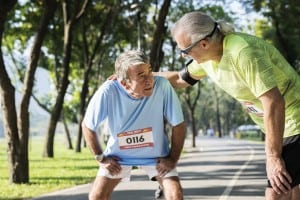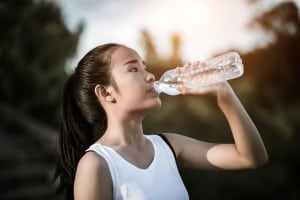By Theresa Woodard, MD, internal medicine practitioner at Harbor of Health
Summertime in Memphis is synonymous with heat and humidity – but longer days and a break from the school routine also make it a good time to get outdoors and get active. Therefore, it’s time to adopt a new mantra: “Learn to love water.”

Dr. Theresa Woodard says it’s important to protect against dehydration before symptoms even start – especially during the hot, humid summer months.
If you want to get more active this summer, start by visiting your doctor for a checkup. Then, as you put your physician’s advice to use, remember that staying hydrated is always important, but the heat of summer makes it a lot easier to become dehydrated – and that can be dangerous.
Here’s what I tell my patients to watch out for and how they can avoid getting low on fluids.
First, be especially cognizant on very hot, humid days; if you’re exercising or doing a lot of physical activity; or if you’re sick. Also, older people can be more susceptible to dehydration: as we age, our brains don’t sense dehydration as well and may not send thirst signals.
Keep in mind that symptoms can start subtly.
You may experience dry mouth and feel really thirsty at first, followed by a headache, muscle cramps and general feeling of fatigue. Other red flags include lack of sweating, not producing tears, and less urine or darker-than-normal urine.
Symptoms can quickly worsen to include dizziness, nausea and vomiting, rapid heartbeat and confusion. In extreme cases, dehydration can lead to loss of consciousness and even death.
Bottom line, when your body doesn’t have enough water, it doesn’t work right.
So what can you do about it?
Fortunately, it’s easy and inexpensive to get enough fluid. That’s because the very best choice to stay hydrated under normal circumstances is, without a doubt, water. And, whether you’re at home, work, a restaurant, the park, etc., water is free.

Dehydration can leave you feeling tired, nauseous and dizzy – and if it gets too serious, it can result in death.
I suggest keeping a reusable bottle with you and refilling it throughout the day. You won’t have to pay for bottled water, and you’ll do the Earth a favor by reducing plastic waste.
Since the goal is to take action well before you notice symptoms, try these easy tips:
- Make a schedule. For example, drink water when you wake up, at meals and before bed.
- As soon as you feel hungry, drink a glass of water. Thirst is often confused with hunger.
- Always drink before, during and after a workout.
- Set your smartphone or another device to give you reminders to have a drink of water.
If you don’t love plain water, add slices of lemon, lime and cucumber for flavor. Also, eat water-dense fruits and vegetables that help you stay hydrated, like cucumbers, tomatoes, carrots, watermelon, cantaloupe and strawberries.
Remember that beverages with alcohol or caffeine actually dehydrate you, and options marketed as energy drinks can contain a lot of things your body doesn’t need, like stimulants, added sugar, carbohydrates, calories, carbonation and more.
Another product, sports drinks, can be helpful but should be used in moderation. Sports drinks are formulated to enhance performance, so if you plan to exercise at high intensity for more than an hour, they’re great – the calories, potassium and nutrients provide energy and electrolytes so you can perform longer. However, those same calories don’t do you any favors if you just grab sports drinks for the taste, so drink wisely – especially since one bottle can have several servings.
No matter what, when it comes to hydration, pay attention to your body – especially on these hot and humid summer days. If you start feeling unwell when you’re working outside or exercising, take a break to cool down with a tall glass of water.
Remember, getting enough fluids is something that’s well within reach for all of us, so there’s no reason to leave your body high and dry!
